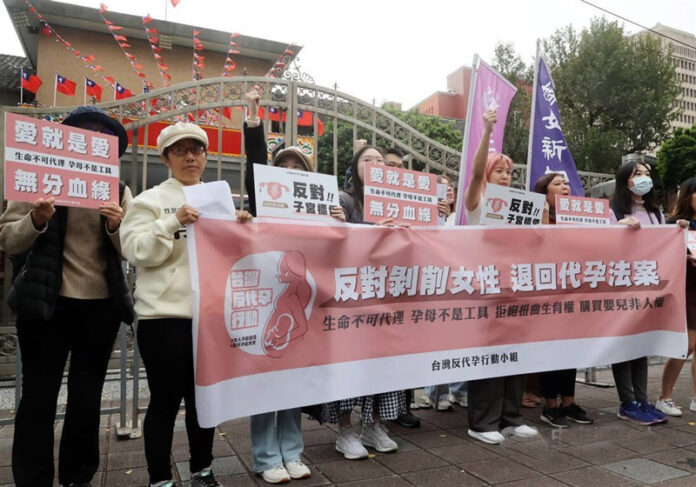Taipei, Taiwan – On Thursday, women’s rights groups gathered outside Taiwan’s Legislature to protest a controversial bill under review that could potentially legalize surrogacy in Taiwan. The proposed amendments to the Assisted Reproduction Act are currently being debated at the Legislative Yuan, sparking significant opposition from anti-surrogacy activists who are concerned about the exploitation of women and the potential commercialization of reproduction.
Proposals for Surrogacy in Taiwan Spark Heated Debate
The Legislative Yuan’s Social Welfare and Environmental Hygiene Committee was scheduled to review sixteen amendments to the Assisted Reproduction Act, including provisions that could allow single women, same-sex couples, and surrogate mothers to access artificial insemination. Among these, five proposals directly related to surrogacy have drawn the most attention. These proposals, presented by Kuomintang (KMT) lawmakers and the Taiwan People’s Party (TPP), suggest changes that could lead to the legalization of surrogacy, which is currently banned in Taiwan.
Despite the political push to widen reproductive access, anti-surrogacy groups argue that the bill fails to account for the risks associated with surrogacy and its potential for exploitation. Women’s rights activists contend that surrogacy could commodify women’s bodies, turning them into vessels for reproductive labor.
Activists Protest Outside the Legislature
Outside the Legislative Yuan, demonstrators carried banners with slogans such as “Oppose the exploitation of women, Withdraw the surrogacy bill” and “Women are not for rent, Children are not for sale.” Among the protestors was Chen Shu-fang (陳書芳), secretary-general of Taiwan’s Women’s Link, who argued that surrogacy poses significant physical and mental health risks to surrogate mothers. “Studies have shown that surrogacy carries higher health risks than traditional pregnancies,” Chen said, calling for an immediate halt to the bill’s review.
Activists also criticized the potential commercialization of surrogacy, with Chen Kai-ning (陳愷寧), spokesperson for the Taiwan Anti-Surrogacy Action Group, suggesting that the real motivation behind the proposals was to benefit reproductive health institutions seeking to profit from the practice.
Concerns Over the Impact on Women’s Rights and Ethnic Groups
Wang Hsiao-han (王筱涵), a representative from the Awakening Foundation, a Taiwanese women’s rights group, raised concerns about how the bill could contradict fundamental human rights. “The so-called ‘right to have children’ conflicts with the United Nations Convention on the Rights of the Child,” she explained, warning that legalizing surrogacy could lead to the exploitation of economically disadvantaged women.
Savungaz Valincinan, president of the Indigenous Youth Public Participation Association, further warned that Indigenous women, often economically disadvantaged, could be among the first to be exploited under such a system. She emphasized the need for a comprehensive impact assessment that considers ethnicity, gender, and socio-economic factors before any legislative changes are made.
Taiwan’s Ministry of Health and Welfare Withdraws Surrogacy Proposal
The issue of surrogacy gained widespread attention earlier this year when Taiwan’s Ministry of Health and Welfare (MOHW) proposed draft amendments to the Assisted Reproduction Act on May 14. However, the MOHW withdrew its proposal to establish a “surrogate mother system” earlier this week after facing criticism from eight Democratic Progressive Party (DPP) lawmakers, who voiced concerns about the potential harms of surrogacy.
Despite the withdrawal of this particular provision, lawmakers at the Legislative Yuan are continuing to review the proposed amendments, including the controversial surrogacy provisions. The debate is likely to continue, with strong opinions on both sides of the issue.
Table: Key Details of the Proposed Surrogacy Bill
| Aspect | Details |
|---|---|
| Proposals Under Review | 16 amendments to the Assisted Reproduction Act |
| Key Proposals on Surrogacy | 5 proposals related to surrogacy by KMT & TPP |
| Current Legal Status | Surrogacy is currently illegal in Taiwan |
| Primary Concerns | Health risks to surrogate mothers, exploitation of women |
| Opposition Groups | Women’s Link, Awakening Foundation, Taiwan Anti-Surrogacy Action Group |
| Impact on Ethnic Groups | Concerns over the exploitation of Indigenous women |
| Government Response | MOHW withdrew its surrogacy proposal on Tuesday |
Frequently Asked Questions (FAQs)
1. What is the proposed surrogacy bill in Taiwan?
The proposed amendments to the Assisted Reproduction Act could legalize surrogacy in Taiwan and allow broader access to artificial insemination for single women, same-sex couples, and surrogate mothers.
2. Why are women’s rights groups protesting the bill?
Protestors are concerned about the potential exploitation of women’s bodies, the health risks to surrogate mothers, and the commercialization of childbirth. They argue that surrogacy could commodify women’s reproductive capacity.
3. What are the health risks of surrogacy?
Studies indicate that surrogacy carries higher physical and mental health risks compared to traditional pregnancies, including complications during pregnancy and potential long-term emotional challenges.
4. How does surrogacy impact Indigenous women?
Activists like Savungaz Valincinan warn that economically disadvantaged Indigenous women could be disproportionately affected by the commercialization of surrogacy, leading to exploitation.
5. What is the current status of surrogacy in Taiwan?
Surrogacy is currently illegal in Taiwan, but there is an ongoing debate in the Legislative Yuan regarding the potential legalization of the practice.
